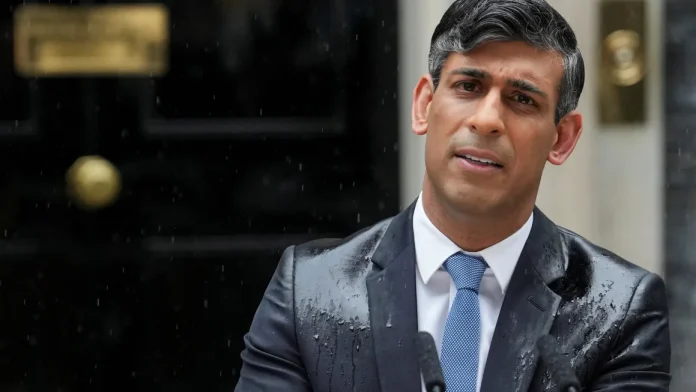British Prime Minister Rishi Sunak announced a snap general election on 4 July in a statement in Downing Street on Wednesday night.
Sunak said outside Downing Street that he had informed King Charles III of the rare summer poll, firing the starting gun on a six-week campaign that is almost universally expected to conclude in the demise of his Conservative government. He said:
“I cannot and will not say that we have got everything right. No government should. But I am proud of what we have achieved together, the bold actions we have taken and I’m confident about what we can do in the future.”
The minister’s opening speech was overshadowed after journalists were forcibly removed from his event by security guards.
Political correspondent Darren McCaffrey said they were kept out because broadcasting arrangements were “pooled” so other broadcasters were forced to share footage with others.
Sir Keir Starmer said it was “time for change” and urged Britons to vote Labour in response to the Prime Minister’s announcement. He also added:
“By the force of our democracy, power returns to you. A chance to change for the better your future.”
How to vote in July elections
Meanwhile, voters are concerned about the schedule of polling stations. Authorities say voting centres will open at 7 a.m. and will close at 10 p.m. so that those who work can vote before or after work, even during their lunch break.
But if this is not possible, staff have the right to request time off work, although the decision to grant time off is at the discretion of their supervisor. Whilst many people consider polling days to be important, they are not days off work.
It will be possible to vote in the general election by mail. In this case, the voter will simply apply online in advance.
As written on the Electoral Commission’s website:
“There are changes to voting by post. The changes apply to UK Parliament general elections, by-elections and recall petitions. You can apply online to vote by post and need to prove your identity when applying. You also need to reapply for a postal vote every three years.
If you are away on holiday or because of work, you will receive a postal vote ballot, with detailed explanations on how to deal with it. If you can’t post it yourself, ask someone that you trust to post it for you.”
Proxy voting in the UK
An alternative to postal voting is proxy voting. If you know you will not be able to go to the polling station on election day, you can ask a proxy to vote on your behalf. This person, your proxy, can vote for you at the polling station or apply to vote on your behalf by post. When you apply to vote by proxy, you must state your reason for doing so. You can apply online six days before election day. The deadline for postal proxy voting is 11 working days before election day.
The past local elections have left Britain’s Conservatives despondent, with the party facing one of its worst local election results in 40 years as Labour across England and Wales made astonishing gains on the key battlegrounds they needed to win the general election.
